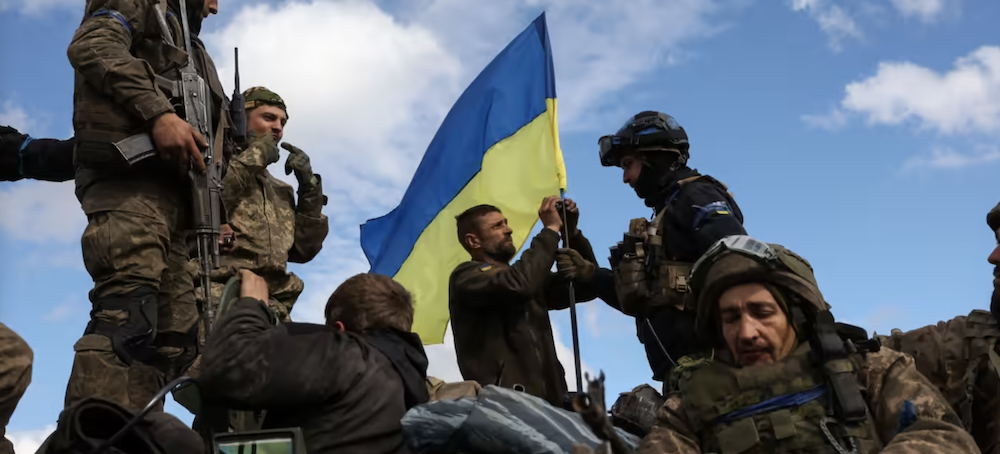'The Temptation Exists Among EU Member States to Abandon the Israeli-Palestinian Front in Favor of the War in Ukraine'
Philippe Ricard Le Monde Ukrainian soldiers adjust a flag atop a personnel carrier on a road. (photo: Anatolii Stepanov/AFP)
Ukrainian soldiers adjust a flag atop a personnel carrier on a road. (photo: Anatolii Stepanov/AFP) 'The Temptation Exists Among EU Member States to Abandon the Israeli-Palestinian Front in Favor of the War in Ukraine'
Philippe Ricard Le Monde
Some EU members are inclined to let Washington take responsibility at Israel's side, while they focus their attention on their commitments to Kyiv, writes Le Monde's Philippe Ricard in his column.
More than a month after the terrorist attacks carried out by the Palestinian movement on October 7, the leader of the easternmost of the European Union's 27 member states intends to encourage the rest of the EU to take a closer interest in the conflict: "We would like it to become more involved in the region, which is part of the EU's neighborhood. But we don't see any clear strategy," said Christodoulides in an interview with Le Monde. "Nobody is going to forget Ukraine, but Brussels must also be able to play a major role in the current crisis in the Middle East," he added.
After demonstrating almost perfect unity in the face of Russia's aggression in Ukraine, perceived as an existential threat to the continent, the EU member states are hesitating over their diplomacy in the Middle East. Divisions run deep and wide, not only between member states but also between EU bodies. European Commission President Ursula von der Leyen's express visit to Israel on October 13 exasperated certain capitals, starting with Paris. It also angered her great Brussels rival, European Council President Charles Michel, who, like the High Representative Josep Borrell, was more attentive to the anger of Arab countries. With no mandate from member states, von der Leyen gave her unreserved support to the Israeli government.
'Brutalization' of international relations
Since then, the very question of a "ceasefire," refused by Israel in order to better "destroy" Hamas, has divided the capitals: Emmanuel Macron, who is also struggling to find the right balance, is now in favor of it, against the advice of the German Chancellor, Olaf Scholz, anxious not to distance himself from Israel, in the name of the Hebrew state's right to defend itself. Under these conditions, it's hard to see Europeans having any influence on the course of the conflict, or even on any eventual way out of the crisis.
The leaders of the 27 know that the Israeli authorities have never heeded their recommendations, and prefer more than ever their alliance with the United States, the sole guarantor of Israel's security. What's more, after 15 tumultuous years (the eurozone crisis following Greece's bankruptcy, the migration crisis, Brexit, Covid and the invasion of Ukraine), their collective influence on the international stage, and the influence of individual member states, starting with France, appears to be waning. European soft power is no match for the "brutalization" of international relations, even in the EU's immediate neighborhood. Despite the rhetoric from Brussels, Paris and Berlin about European sovereignty, the EU has neither the experience nor the weapons to play a leading geopolitical role.
Above all, Europeans are torn between the Israeli-Palestinian front and the war in Ukraine. The temptation exists within the 27 to abandon the former in favor of the latter. While the United States is setting the tone, some are inclined to let Washington shoulder its responsibilities on Israel's side, while focusing their attention on the commitment to Kyiv. This stance is all the stronger given that the 27, like Ukrainian President Volodymyr Zelensky, sense that the United States is in danger of focusing on the Israeli-Palestinian conflict, to the detriment of the war in Ukraine.
Russian invasion overshadowed
Since October 7, the Hamas attacks and Israel's response have almost eclipsed the Russian invasion and the difficulties of the Ukrainian counter-offensive. "The crisis in the Middle East is clearly not helping the Ukrainians," said a European diplomat. On the eve of the American presidential campaign, these events threaten to make the debate in Washington over continued support for Ukraine even more heated, at the risk of placing Europe ever more in the front line, even though it is not about to take the place of the United States, particularly in military terms. The 27 seem unable to deliver the million rounds of ammunition promised to Kyiv by March 2024.
Choosing between the two fronts, however, is difficult, if not impossible, given the extent to which they intersect, at least on the diplomatic front. Vladimir Putin is well aware of this: the Russian president is trying to capitalize on the Israeli-Palestinian conflict, which he sees as an opportunity to illustrate the West's "double standards." He sees it as an opportunity to drive a wedge between the West and the "rest of the world," those developing and emerging states that are reluctant to choose sides between Kyiv and Moscow, and between their main partners, Washington and Beijing.
"The Israeli-Palestinian conflict has become the yardstick for the presumed duplicity of the West, particularly in the Arab world," said a French diplomat. In his view, it is in Europe's greatest interest to find the right position concerning the ongoing fighting in the Gaza Strip, if it is to continue to exert influence in favor of Ukraine.
